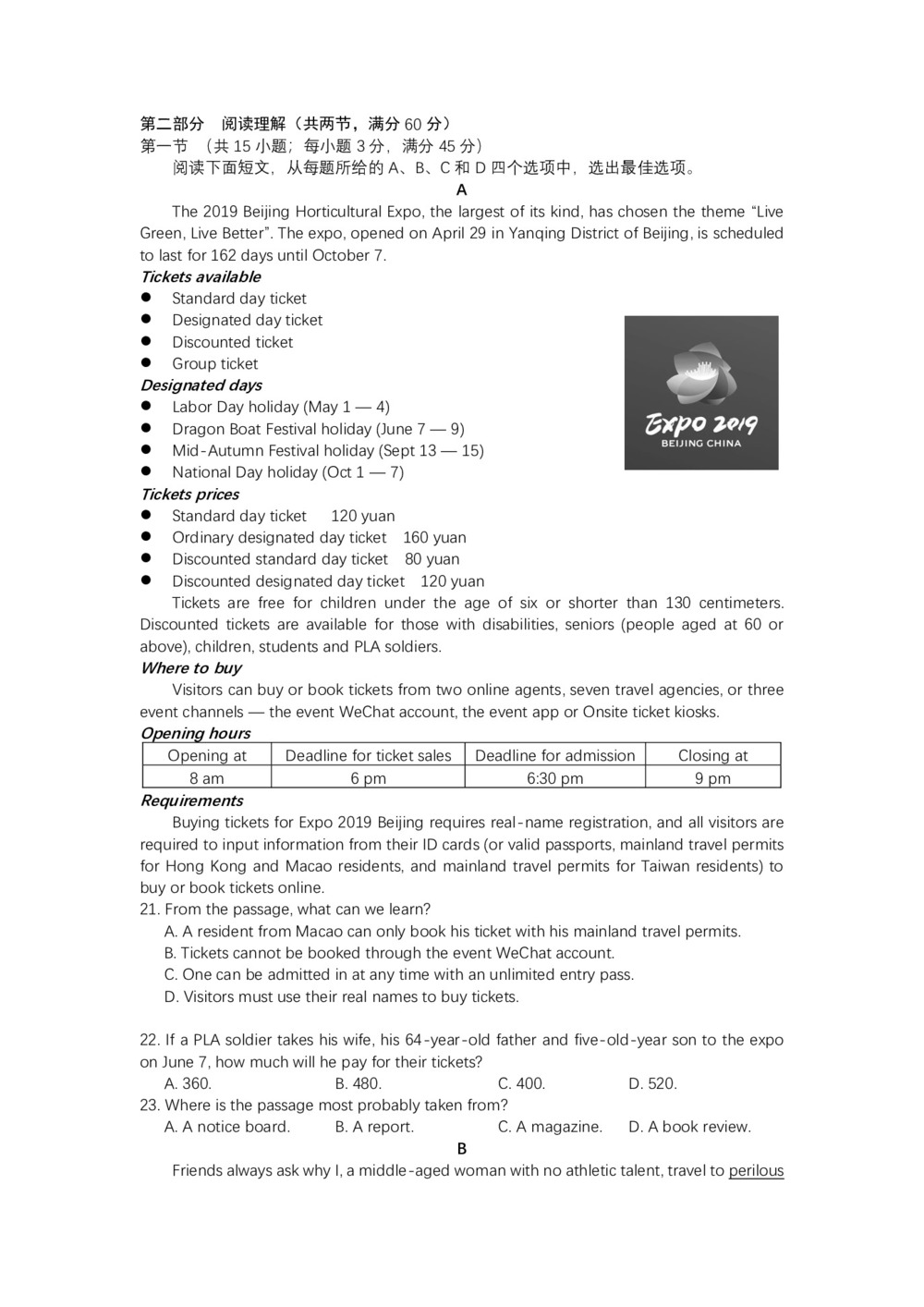
第二部分 阅读理解(共两节,满分60分)
第一节 (共15小题;每小题3分,满分45分)
阅读下面短文,从每题所给的A、B、C和D四个选项中,选出最佳选项。
The 2019 Beijing Horticultural Expo, the largest of its kind, has chosen the theme "Live Green, Live Better". The expo, opened on April 29 in Yanqing District of Beijing, is scheduled to last for 162 days until October 7.
Tickets available
* Standard day ticket
* Designated day ticket
* Discounted ticket
* Group ticket
Designated days
* Labor Day holiday (May 1 - 4)
* Dragon Boat Festival holiday (June 7 - 9)
* Mid-Autumn Festival holiday (Sept 13 - 15)
* National Day holiday (Oct 1 - 7)
Tickets prices
* Standard day ticket 120 yuan
* Ordinary designated day ticket 160 yuan
* Discounted standard day ticket 80 yuan
* Discounted designated day ticket 120 yuan
Tickets are free for children under the age of six or shorter than 130 centimeters. Discounted tickets are available for those with disabilities, seniors (people aged at 60 or above), children, students and PLA soldiers.
Where to buy
Visitors can buy or book tickets from two online agents, seven travel agencies, or three event channels - the event WeChat account, the event app or Onsite ticket kiosks.
Opening hours
Opening at Deadline for ticket sales Deadline for admission Closing at 8 am 6 pm 6:30 pm 9 pm Requirements
Buying tickets for Expo 2019 Beijing requires real-name registration, and all visitors are required to input information from their ID cards (or valid passports, mainland travel permits for Hong Kong and Macao residents, and mainland travel permits for Taiwan residents) to buy or book tickets online.
21. From the passage, what can we learn?
A. A resident from Macao can only book his ticket with his mainland travel permits.
B. Tickets cannot be booked through the event WeChat account.
C. One can be admitted in at any time with an unlimited entry pass.
D. Visitors must use their real names to buy tickets.
22. If a PLA soldier takes his wife, his 64-year-old father and five-old-year son to the expo on June 7, how much will he pay for their tickets?
A. 360. B. 480. C. 400. D. 520.
23. Where is the passage most probably taken from?
A. A notice board. B. A report. C. A magazine. D. A book review.
Friends always ask why I, a middle-aged woman with no athletic talent, travel to perilous places - the jungles of Thailand or Borneo, for example, where the water is often unsafe and the food risky; places with infectious diseases, poisonous snakes and the wildest animals; some places where the locals are just a few generations past headhunting.
I never know how to answer. My travel decisions assumed a new gravity nine years ago after I suffered a stroke. To prevent another stroke, my doctors told me, I'd have to take dangerously high levels of blood thinner (血液稀释剂) for the rest of my life and any travel would be risky.
I had to think about what was important to me: family, of course, and friends. But then what? No matter how many times I thought about it, no bucket list was complete without travel. Then I had to decide how I might manage the risk. I had to decide how lucky I felt.
My return to travel after my stroke came in baby steps. The first real test of my travel courage came nine months after my stroke when I joined my husband, Jack, on a business trip to China. After we'd toured the remains of a Tang dynasty temple on a high mountain, Jack wanted to ride down on a toboggan (长雪橇).
Before the stroke it would've seemed like fun. But now? I hesitated. My mental klaxon (高音喇叭) screamed warnings about the consequences of a cut, a fall, and a crash. Then, gaining confidence from who knows where, I lowered myself carefully into the toboggan, which marked my adventure travel comeback.
In the years since then, I've traveled about twenty-five percent of the time. Through it all, my lucks held out - no deadly falls, no car accidents or serious infections. For me, adventure travel is a risk worth taking. Travel broadens my world and keeps me connected to nature. What's more, saying "yes" to travel keeps me connected to myself.
24. What does the underlined word "perilous" in Paragraph 1 probably mean?
A. Unique. B. Dangerous. C. Historical. D. Famous.
25. What did the doctors advise the author to do?
A. Do proper exercise. B. Enjoy the rest of her life.
C. Keep away from traveling. D. Spend more time with her family.
26. Why did the author mention her travel to China?
A. It was her last adventure.
B. She recovered her courage through it.
C. She liked the beautiful scenery in China.
D. It was the most dangerous experience in her life.
27. What is the best title for the text?
A. A business trip to China B. Unique travel experiences
C. Why I still travel to the wild D. How I overcame the fear of disease
-
相关试卷下载
- 1《302edu发布》山西省太原市第五中学2019届高三下学期阶段性检测(4月)英语 Word版含答案
- 2《302edu发布》重庆市第一中学2019届高三下学期4月模拟考试 英语 Word版含答案
- 3《302edu发布》江苏省溧水高级中学2019届高三下学期回归性考试(5月) 英语 Word版含答案(含听力)
- 4《302edu发布》江苏省扬州中学2019届高三下学期开学考试(2月) 英语 Word版含答案
- 5《302edu发布》山西大学附属中学2019届高三下学期4月模块诊断 英语 Word版含答案
- 6《302edu发布》山西大学附中2019届高三下学期3月模块诊断 英语 Word版含答案
- 7《302edu发布》江苏省扬州中学2019届高三下学期4月质量检测 英语 Word版含答案
- 8《302edu发布》江苏省扬州中学2019届高三下学期3月月考英语试题 Word版含答案
- 9《302edu发布》福建省龙海市第二中学2019届高三下学期期初考试 英语 Word版含答案(含听力)